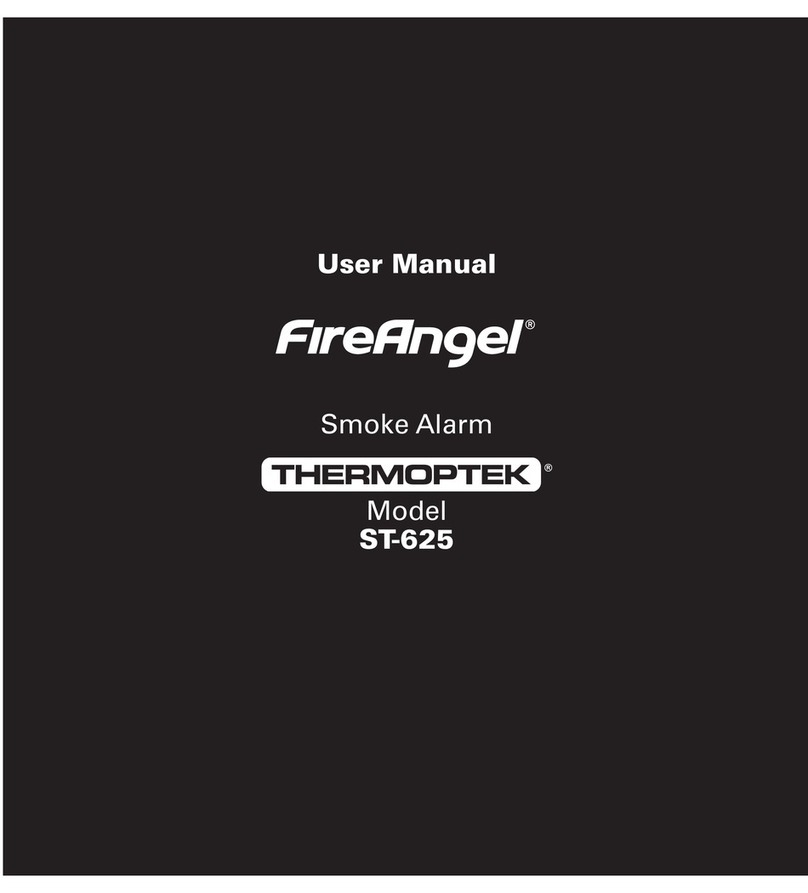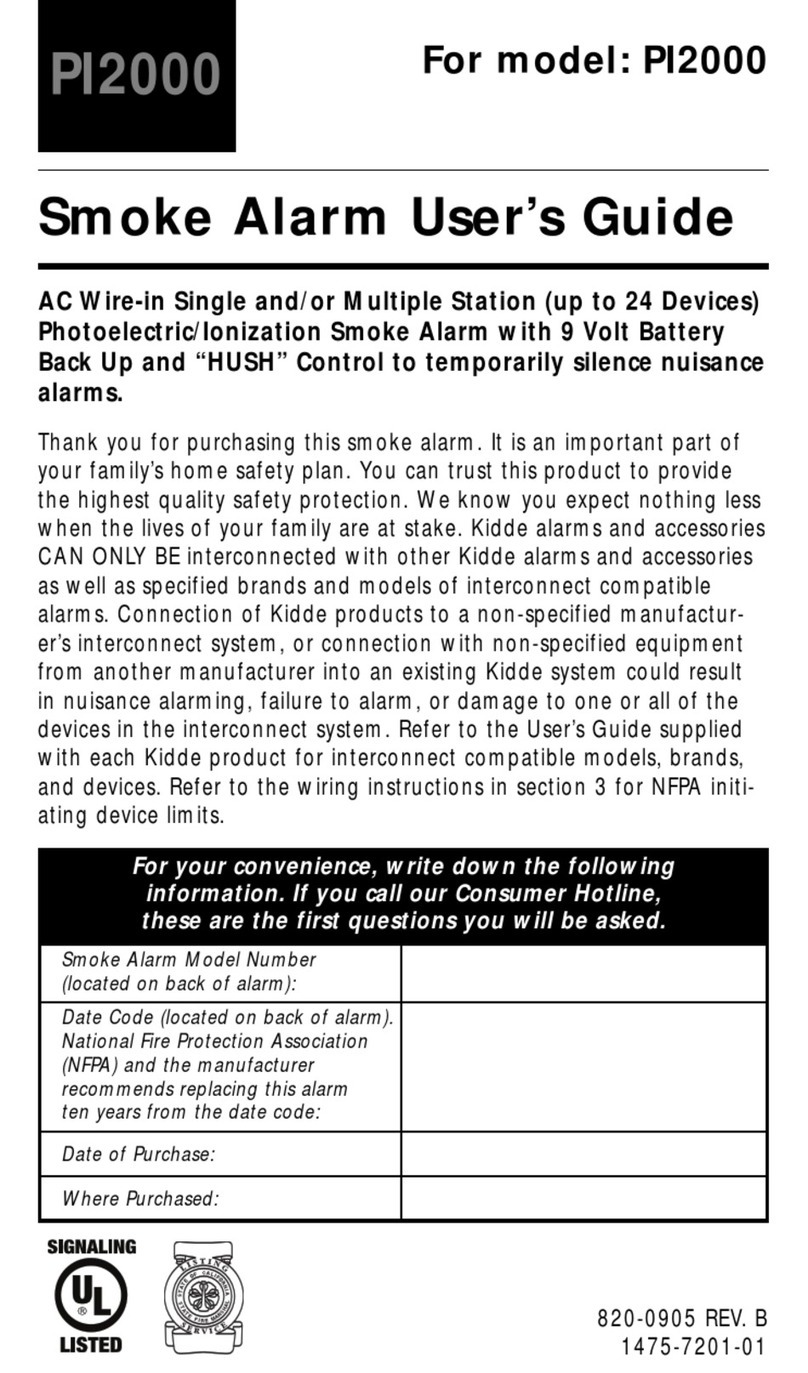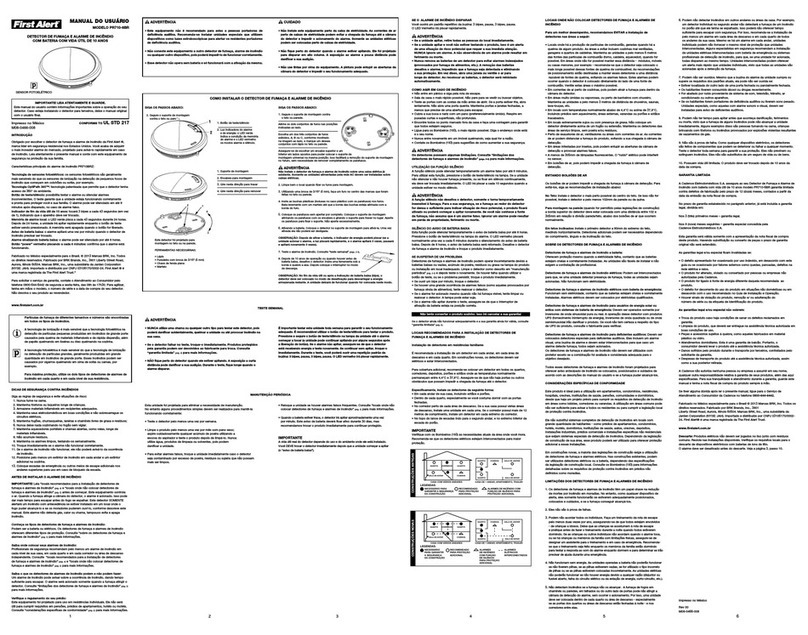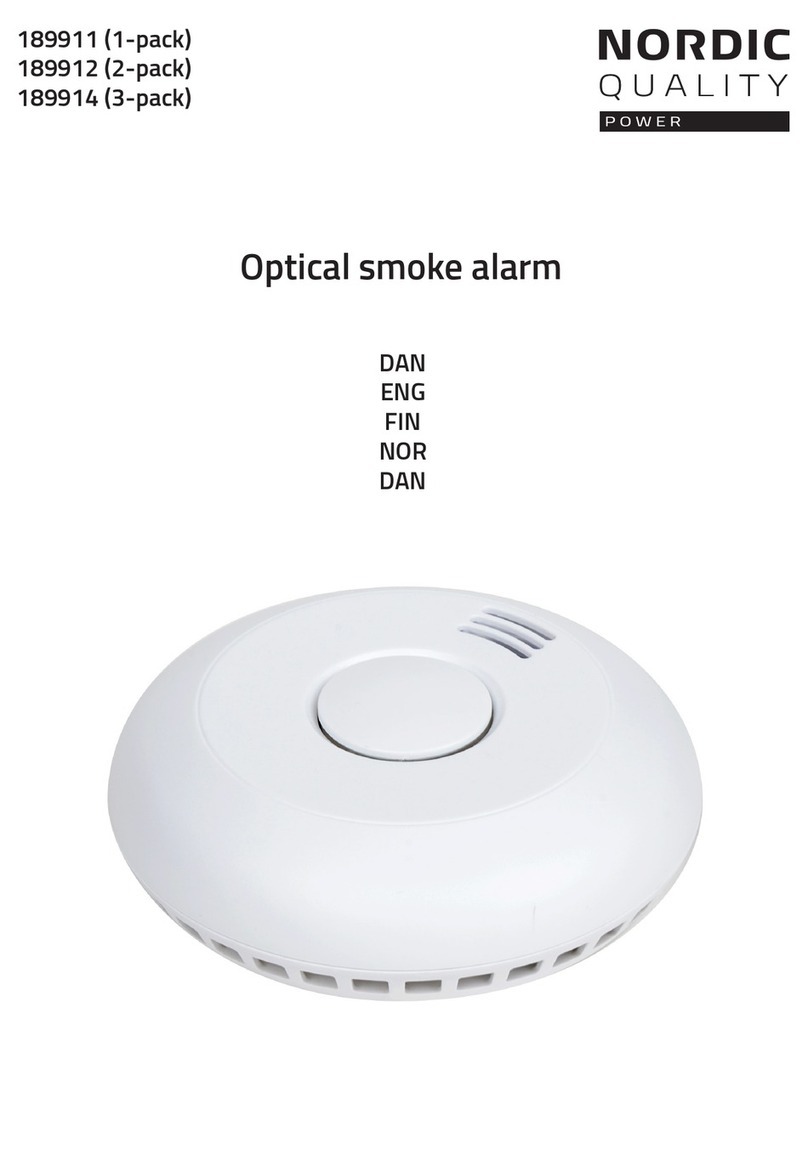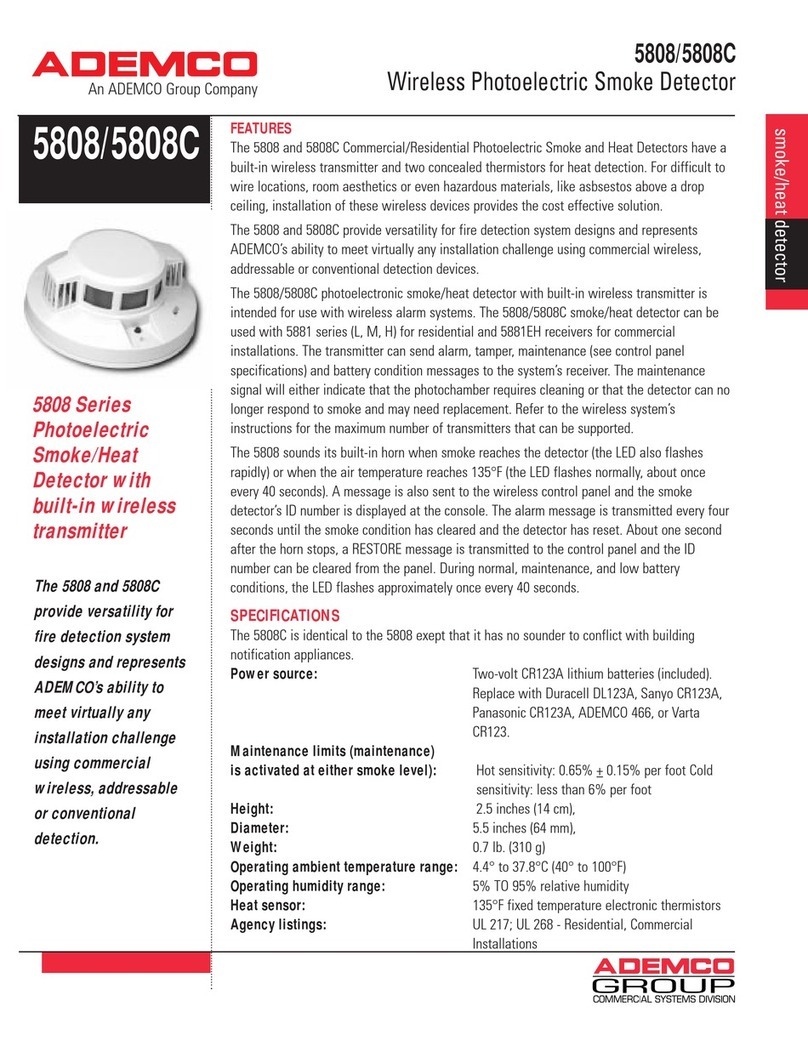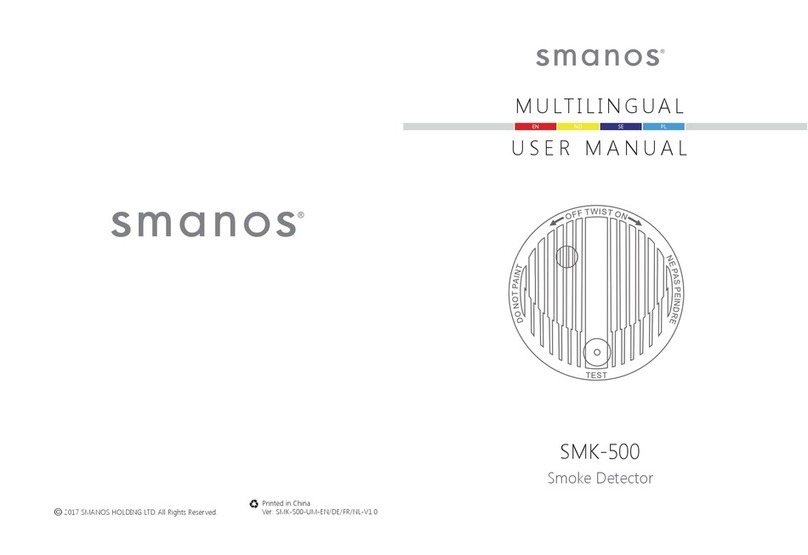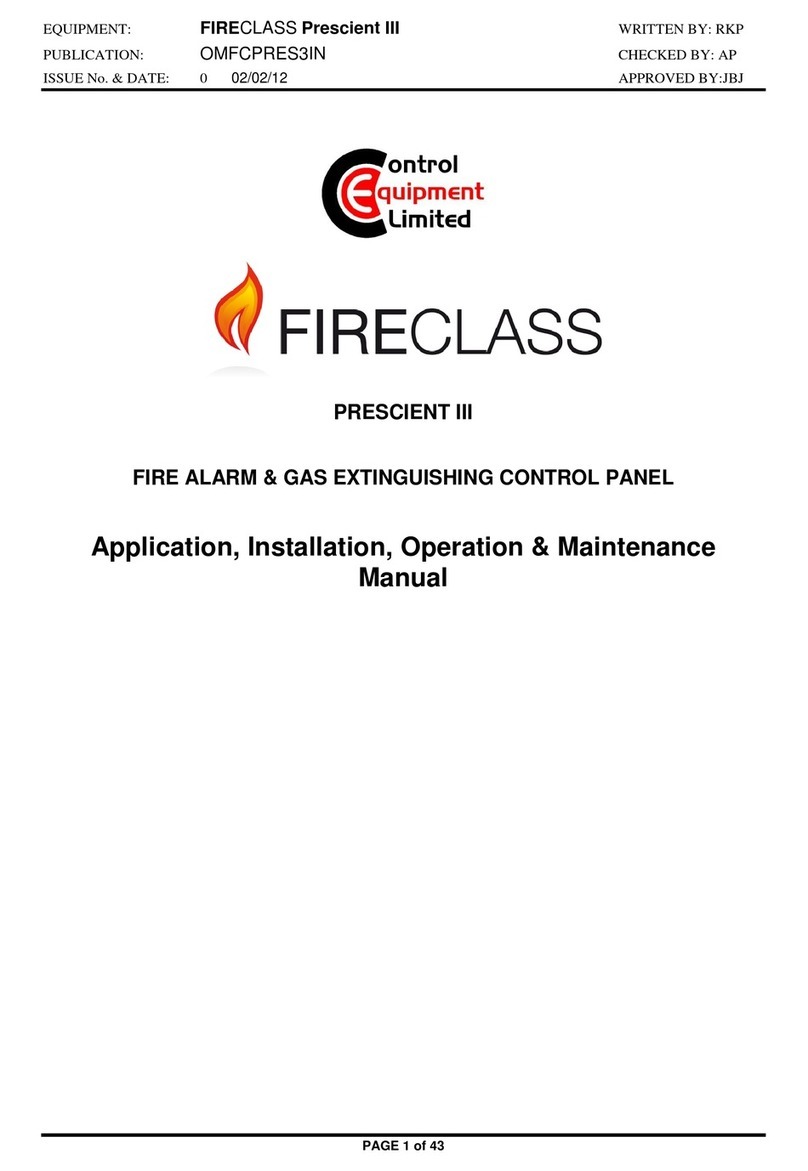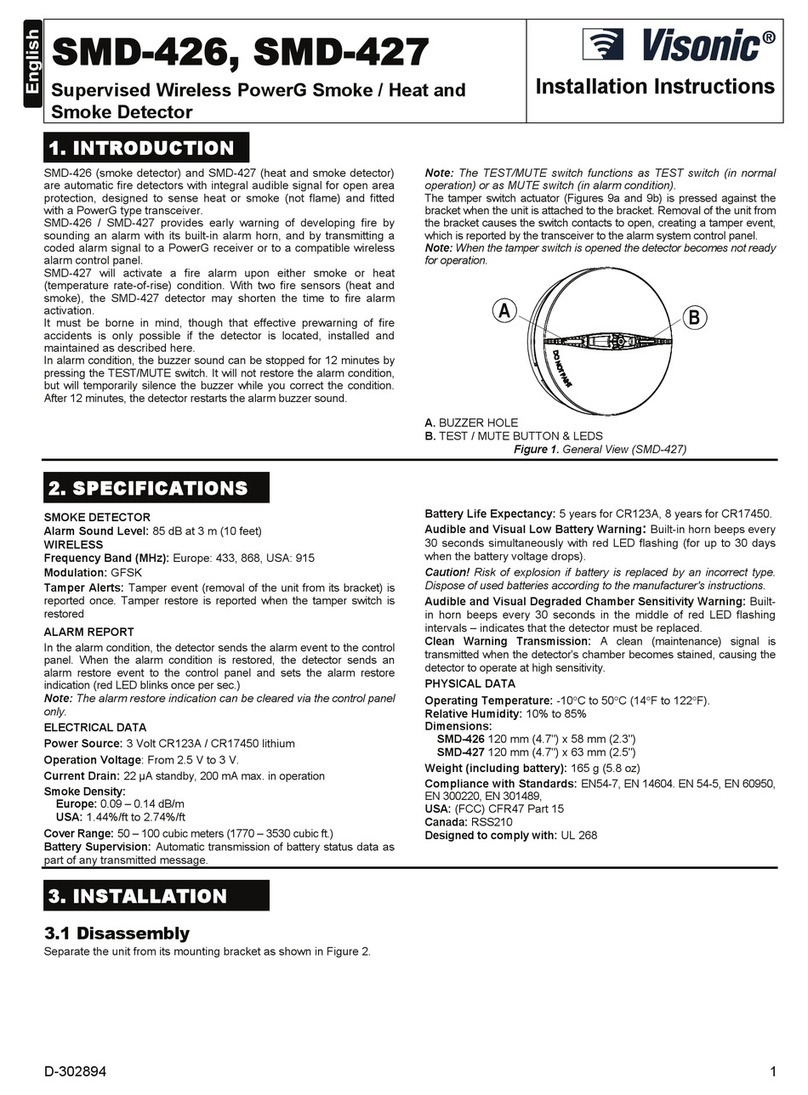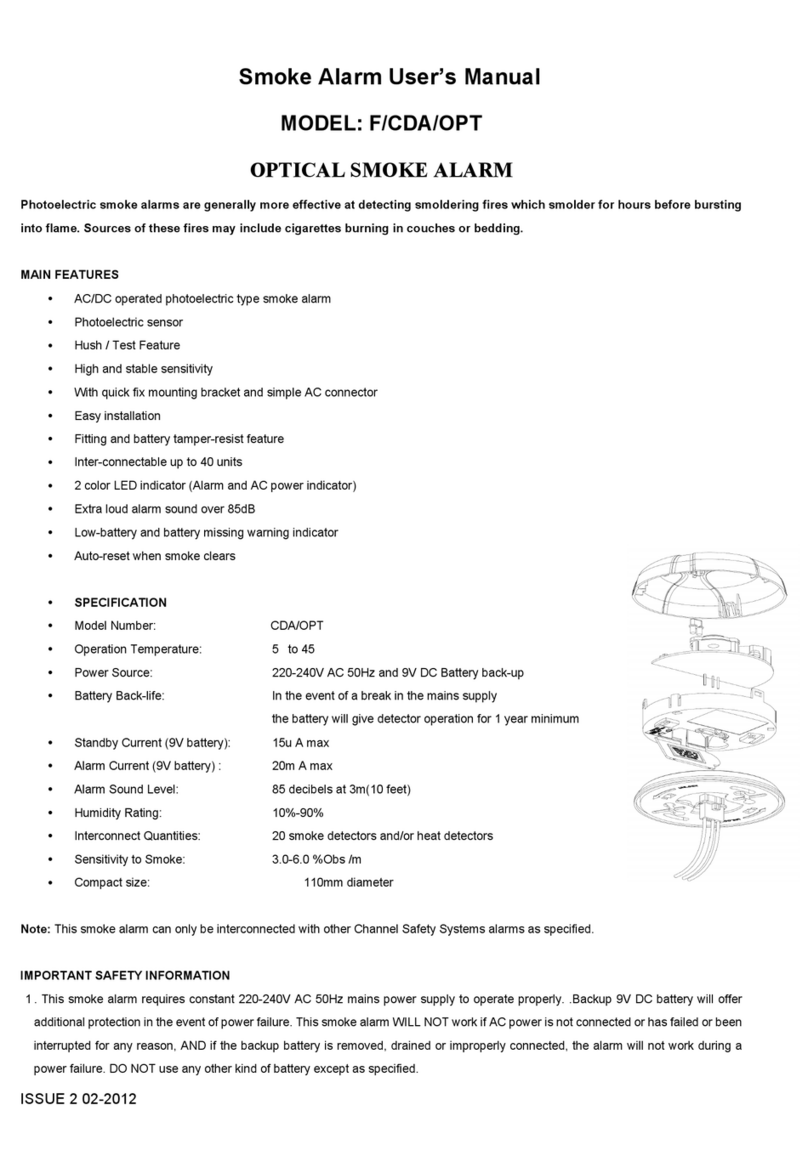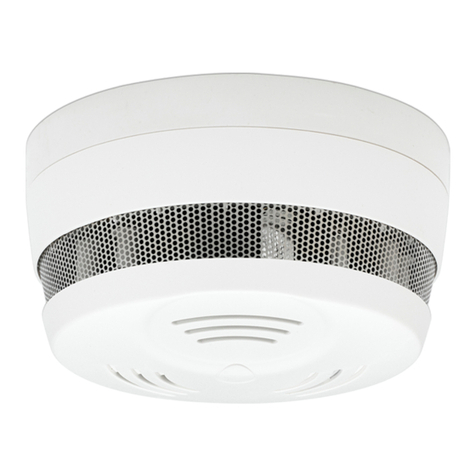Thermoptek FireAngel ST-620 User manual

User Manual
SMOKE
ALARM
10 YEAR LIFE
ST-620
Please read me – as I could save your life.

INTRODUCTION
AUTOMATIC POWER ENGAGE
SENSOR TECHNOLOGY
APPLICATION
POSITIONING
LIMITATIONS
HOW TO INSTALL YOUR
SMOKE ALARM
1 Preparation
2 Install mounting plate
3 Fit your smoke alarm
4 Test your smoke alarm
OPERATION
Normal Condition
Low Power Pack Condition
ALARM TEST
ALARM SMART SILENCE™
ROUTINE MAINTENANCE
WHAT TO DO IN CASE OF
FIRE IN YOUR HOME
REPAIR
TROUBLESHOOTING
DISPOSAL
HOW TO MAKE YOUR HOME
SAFER
WARRANTY
RETURNS
PRODUCT RANGE
NOTES
2
2
3
3
5
6
8
10
10
11
13
14
15
16
18
18
20
21
21
22
CONTENTS
Note: This User Manual is also available in large text and other
formats. Please call 0800 141 2561 for further information

2
AUTOMATIC POWER
ENGAGE
Your 10 year life smoke alarm is powered
by an internal lithium power pack. To avoid
unnecessary use of the power pack prior to
installation, and to ease disposal when the
alarm reaches the end of its life, the alarm is
supplied with the power pack in a deactivated
state. The power pack is automatically
enabled when the alarm is fully locked on to
the mounting plate.
WARNING: This automatic power
engage system only applies to the
following 10 year smoke alarms:
ST-620
IMPORTANT: Your alarm will not work
until it is correctly located and secured
on the mounting plate.
INTRODUCTION
Congratulations! You’ve made a wise
investment in protecting your family and home.
The ST-620 multi-criteria high performance
detector is the ultimate alternative to traditional
alarms. Groundbreaking Thermoptek
technology combines the very latest in
optical sensing with thermal enhancement,
providing faster response to both fire types
eliminating the need for ionisation sources
which can be harmful to the environment.
The FireAngel range of products is constantly
being improved and expanded. Please visit
www.fireangel.co.uk to find out about the
latest additions to our range of innovative
products.
IMPORTANT: This user manual
containsimportantinformationregarding
the operation of your FireAngel smoke alarm.
Ensure you read this user manual fully before
installing and operating the alarm. If you are
installing this smoke alarm for use by others,
you must leave this manual (or a copy of it)
with the end user.

3
SENSOR TECHNOLOGY
Traditionally 3 types of senor technology have
been used in domestic self contained fire
alarms.
Optical smoke alarms are typically more
effective at detecting slow burning fires,
which can smoulder for hours before bursting
into flames.
Ionisation smoke alarms are generally more
effective at detecting fast, flaming fires which
consume combustible materials rapidly and
spread fire quickly.
Heat alarms are triggered when room
temperature reaches a set point (typically
56°C) these alarms are generally used in
locations where other alarm types are not
suited.
THERMOPTEK SENSOR TECHNOLOGY
Thermoptek technology combines a state of
the art optical sensing chamber with thermal
enhancement so not only is the alarm effective
at detecting slow burning fires, constant
monitoring of temperature changes enables the
sensitivity of the alarm to be instantly increased
thereby quickening the typical response time
to fast flaming fires significantly.
APPLICATION
WARNING: Your FireAngel smoke
alarm can be installed into a new
build property as additional protection
to an existing smoke detection system
only. It cannot be used as a substitute for
a hard wired system as required in new
build properties. In this type of property
the building regulations require alarms
to be interlinked. You can obtain further
information from your local fire service or
building control department at your local
council offices. These sources generally
provide advice on new builds or projects
that require planning permission.
Your smoke alarm typically meets the
minimum requirements for family living units
in existing buildings, as long as at least one
unit is installed on each floor/level of your
property.
In order to achieve the earliest fire warning,
we recommend that a smoke alarm is fitted in
all rooms where the temperature is normally
between 4°C (40°F) and 38°C (100°F).
Check the section on ‘Positioning’ to ensure
that the smoke alarm is to be correctly
positioned for the particular dwelling into
which it is intended to be installed.
WARNING: The alarm positions
shown below are based on typical
homes. Construction and layout of individual

4
dwellings will vary, so this should be
regarded only as a guide. Check with your
local fire station for further guidance.
Multi-family or mixed occupant residence
(Tenancy building, student accommodation)
Your FireAngel smoke alarm can also be used
in individual flats and bedsits, providing the
same conditions are met as for a single-family
residence. However, there must already be
a primary fire detection system that meets
LOUNGE
CELLAR
BEDROOMBEDROOM HALL
DINING ROOM
MINIMUM RECOMMENDATIONS
EXISTING HOMES
NOTE: Kitchens should be covered by a
self contained heat detector.
RECOMMENDED FOR ADDITIONAL
PROTECTION
regulatory requirements for common areas
such as lobbies and hallways.
Institutions and Hotels
This includes motels, hospitals, day care
facilities, long-term health care facilities,
boarding houses and dormitories. Your
smoke alarm can be used in individual
sleeping/resident rooms, providing the same
conditions are met as for a single-family
residence. However, there must already be
a primary fire detection system that meets
regulatory requirements for common areas
such as lobbies and hallways. Use of this
smoke alarm in common areas may not
provide sufficient fire warning to residents
or meet regulatory requirements. This smoke
alarm is designed to operate as a standalone
smoke alarm.
WARNING: This FireAngel smoke
alarm will not communicate with other
smoke alarms or fire alarm systems. It is
not intended as a substitute for a complete
alarm system.
Mobile Homes and Caravans
This smoke alarm is suitable for use in mobile
homes and caravans.
Commercial and Industrial Premises
This smoke alarm is not intended for any
non-residential, commercial or industrial
application, nor for any other purpose than
described above.

5
POSITIONING
Thermoptek smoke alarms are less prone
to false alarms from cooking fumes, and
are therefore suitable for locations near
kitchens. However like other types of smoke
alarms, thermoptek smoke alarms can be
susceptible to nuisance alarms from steam
and should not be located too close to
bathrooms and showers.
It is recommended that your FireAngel
smoke alarm is NOT to be fitted in the
following locations:
• Bathrooms, shower-rooms, and other very
damp or humid areas, where the moisture
can cause unwanted alarms.
• Kitchens. Kitchen areas should be
protected with self-contained Heat Alarms,
as the combustion particles from cooking
in kitchens will result in unwanted alarms
and permanent contamination of the smoke
alarm’s sensor.
• In areas where excessive dust or dirt could
contaminate the sensing chamber, making
it over sensitive or impairing smoke entry.
• In areas where the ambient temperature
is not controlled and may regularly drift
below 4°C (40°F) or above 38°C (100°F)
e.g. unheated buildings, open attic
spaces.
• Very dirty, dusty or greasy areas.
• In very draughty areas, such as close to
ceiling fans or fresh air vents. Draughts can
blow smoke away from the alarm.
• In insect infested areas. Insects can
clog openings to the sensing chamber,
preventing smoke entry or causing
unwanted alarms.
• Within 30cm (12”) of a uorescent light
fitting which emits electrical ‘noise’ that can
prevent correct alarm operation.
• In wall positions that are more than 30cm
(12”) away from the ceiling (see ‘How to
install your smoke alarm’).
• In ‘dead air’ spaces (see following
diagram).
• Within 30cm (12”) of light ttings or other
ceiling based obstructions.
WARNING: Prolonged exposure to
temperatures outside those stated above
will reduce product life.

6
1 METRE
(3 FEET) DEAD
AIR SPACES
100MM
(4 INCHES)
100MM
(4 INCHES)
BEST LOCATION
(IN CENTRE OF CEILING)
DEAD
AIR SPACES
WHAT ARE THE
LIMITATIONS OF MY
SMOKE ALARM?
Your FireAngel smoke alarm is designed to
alert you by sounding an alarm when it senses
smoke, i.e. it can only sense smoke and alert
you if smoke reaches it! If a fire develops in
an area remote from the location of the smoke
alarm, such as another room or another level,
smoke may not reach the smoke alarm in
sufficient time or quantity to sense and alert
you to the danger.
We recommend that as a minimum you install
Thermoptek smoke alarms on every floor of
your property. For comprehensive coverage
a smoke alarm should also be fitted in every
room.
This smoke alarm cannot be used to provide
primary fire detection in common areas used
by different residents such as blocks of flats
and hotels. The FireAngel smoke alarm may
not alarm before a fire causes damage,
injury or death, as the smoke may not reach
the smoke alarm in time. Examples include
smoking in bed and violent gas explosions.
This smoke alarm may not respond in a
reasonable time if it is not installed in the best
position, or if furniture or other obstacles are
located between the smoke alarm and the
fire.

7
WARNING: Your smoke alarm will not
operate without sufficient power.
As the alarm’s power pack reaches the end
of its life a low power warning chirp will be
emitted every 40 seconds. When this occurs
you must replace the unit within 7 days.
IMPORTANT: Smoke alarms are
designed to alert you with an audible
alarm at a level specified by the European
Standard EN 14604:2005. Closed doors,
walls and high ambient noise levels will
reduce this level. Temporary or permanently
impaired hearing may result in the alarm not
being heard. Stereos, traffic and other loud
sources may also prevent the alarm being
heard. Heavy sleepers and residents under
the influence of alcohol or drugs may also
not hear or respond to the alarm. Test and
check that you can hear the alarm in all
circumstances. If in doubt install additional
smoke alarms as required.
WARNING: The Smoke alarm is not
suitable for alerting hearing impaired
residents. We recommend that specially
designed warning systems be installed that
will alert hearing impaired residents.
WARNING: The smoke alarm
accompanying this manual employs the
latest technology and is independently tested
as being compliant with all the relevant
European Standards. However, as with any
electronic product it may fail and may not
sense all types of fire within sufficient time to
alert you of the danger and provide adequate
timefor your escape.In order tomaximise your
level of safety always test your smoke alarm
frequently to ensure it is in full working order.
Your FireAngel smoke alarm is only suitable
for use in domestic/ residential applications
as covered in this manual. It is not suitable
for commercial or industrial applications.
It is designed to sense smoke and alert
you. It will not sense carbon monoxide,
flames, or gas. It will not prevent or extinguish
fires.
This FireAngel smoke alarm has a limited life
of 10 years and should not be considered as
a substitute for life or property insurance. Like
all electronic equipment, it can wear out or
fail. It should be tested weekly and replaced
immediately in the event of failure, and
replaced every 10 years regardless.

8
2 Install Mounting Plate
Fit the mounting plate to the ceiling or wall
using the screws provided.
3 Fit Your FireAngel Smoke Alarm
The alarm has a mechanism on the back
that activates the alarm when it is correctly
HOW TO INSTALL YOUR
SMOKE ALARM
IMPORTANT: Make sure you have
read and understood this manual before
installing your smoke alarm.
1 Preparation
The mounting plate should be attached to the
ceiling or wall.
Break out the tabs from the mounting plate.
Use the fixing slots on the mounting plate as
a guide when marking the position of the drill
holes. With an appropriately sized drill, drill
the holes and insert the plastic fixing anchors
supplied (if needed).
MP5
Mounting plate tabs Alarm Mounting Plate
MP5
Lugs (hooks)

9
connected to the mounting plate. There are
three lugs (hooks) on the back of the alarm
that slide in to three slots on the mounting
plate. When used with the new*(MP5)
mounting plate included in this pack the
alarm can be attached in any orientation,
simply line up the lugs (hooks) with the holes
at the end of the slots then twist the alarm
clockwise until the alarm stops, make sure the
alarm is twisted on fully.
Once the smoke alarm has been fitted onto
the mounting plate correctly, the internal
power pack will activate. The red LED on
the front of the alarm should now flash once
every 40 seconds to show that it is active.
*When attaching to some older FireAngel
mounting plates, it is only possible for the
alarm to be attached in one orientation.
Contact the FireAngel Technical Support
Team for advice if required (see page 21)
4 Test Your FireAngel Smoke
Alarm
After fitting the alarm to the base plate, wait
for 5 seconds for the alarm to settle then test
the alarm. See ‘Alarm Test’ on page 10

10
OPERATION
Normal condition
The red LED on the front should flash every
40 seconds to show that the alarm is active.
Low Power Pack Condition
IMPORTANT: Your smoke alarm
requires the power pack to have sufficient
capacity of power to operate correctly.
Should your FireAngel smoke alarm enter a
low power pack condition, the unit will emit
an audible ‘chirp’ once every 40 seconds.
When this occurs you must replace the alarm
immediately. Your FireAngel smoke alarm
will continue to warn of this low power pack
condition for at least 7 days, however, failure
to change the alarm after this time would mean
your smoke alarm may have insufficient power
to alert you in a real fire situation. When the
alarm is removed from the mounting plate the
power pack will automatically deactivate and
the low power warning chirp should stop,
allowing you to dispose of the alarm.
For disposal see page 18.
ALARM TEST
The alarm must be properly attached to the
base plate before it can be tested
a Press the test button in the centre and
release.
b The unit will give an audible alarm
consisting of 2 cycles of 3 loud beeps,
then stop automatically.

11
c The red LED on your alarm will flash rapidly
during the audible signal.
NOTE: The test button accurately tests
the alarm’s smoke sensing circuit, there
is no need to test your alarm with smoke. If
your smoke alarm fails to give an audible test
signal, please refer immediately to the trouble
shooting guide at the end of this manual.
WARNING: As with all electronic
alarm products you should test your
smoke alarm every week.
ALARM SMART
SILENCE™
DANGER: If your FireAngel smoke
alarm emits the full alarm signal and
you are not testing the unit, the smoke alarm
is warning you of a potentially dangerous
situation that requires your immediate
attention. Only use the alarm silence function
after making sure that there is no ongoing fire
emergency situation. Do not block the vents
on the alarm or disable the smoke alarm in
any way, as this will remove your protection.
Smoke alarms can sometimes react to cooking
fumes or other non emergency situations.
Your smoke alarm features “Smart Silence™”
technology. In the event of a known false
alarm your smoke alarm can be temporarily
silenced by pressing the central test button.
Your alarm will automatically return to full
sensitivity within 10 minutes.
NOTE: If the level of smoke reaching the
alarm is very high the alarm silence will
be overridden and the alarm will continue to
sound.

12
c During the reduced sensitivity reset cycle,
the red LED on your alarm will continue
to flash more rapidly than normal,
approximately once every second.
d Your alarm will automatically return to full
sensitivity on completion of the reset cycle
and the red LED will revert to flashing once
every 40 seconds.
DANGER: Never ignore any alarm.
Ignoring the alarm may result in injury
or death. If your smoke alarm activates and
alarms and you are not absolutely certain of
the source of the smoke, get everyone out of
the house immediately.
a Press and release the silence button, the
alarm sound will shortly stop.
b Your alarm will silence and enter into
a reduced sensitivity reset cycle for
approximately 10 minutes.

13
WARNING: Your FireAngel smoke
alarm may false alarm when it is being
cleaned using a vacuum cleaner.
IMPORTANT: Do not use solvents or
cleaners on your FireAngel smoke alarm,
as they may cause damage to the sensor or
circuitry. The unit can be wiped with a slightly
damp cloth.
CAUTION: Do not paint the smoke
alarm as this may block the openings
and prevent smoke from entering the sensor.
ROUTINE MAINTENANCE
Your FireAngel smoke alarm has been
designed to be as maintenance-free as
possible, however there are several things you
must do to keep it working properly.
CAUTION: Your FireAngel smoke
alarm is a sealed electrical device and
no attempt should be made to open the case.
Attempting to open the case will invalidate
your Warranty.
Testing
Test your smoke alarm once every week see
section ‘Alarm Test’ on page 10. Any test
failures should be reported to the FireAngel
Technical Support Team on page 21.
Cleaning
As a minimum your smoke alarm should be
cleaned once every 3 months using your
vacuum cleaner fitted with the soft brush
attachment.

14
• Call the Fire brigade on 999 as soon
as possible from outside your house. If
possible use a neighbours phone or call
box rather than a mobile phone (as the
location can be traced from the number if
the line is lost, or the battery runs out for
example).
• Give the address and your name.
• Never go back inside the building until a
member of the fire service has told you it is
safe to do so.
Contact your local Fire Brigade. They will
give you more ideas about how to make your
home safer from fires and how to plan your
family’s escape.
WHAT TO DO IN CASE OF
A FIRE IN YOUR HOME
• If you have made a family escape plan
and practiced it with your family, you have
increased their chances of escaping safely.
Go over the following rules with your
children each time you have fire drills. This
will help everyone remember them in case
of a real emergency.
• Don’t panic, stay calm. Your safe escape
may depend on thinking clearly and
remembering what you have practiced.
• Notify every member in the residence of
the fire.
• Get out of the house as quickly as
possible. Follow a planned escape route.
Do not stop to collect anything or to get
dressed.
• Feel the doors to see if they are hot. If
they are hot, do not open them – use an
alternative escape route.
• Stay close to the oor. Smoke and hot
gases rise.
• Cover your nose and mouth with a cloth
(wet if possible). Take short, shallow
breaths.
• Keep doors and windows closed. Open
them only if you have to in order to
escape.
• Meet at your planned meeting place after
leaving the house. Carry out a head count.

15
REPAIR
DO NOT attempt to repair your FireAngel
smoke alarm doing so will invalidate your
warranty. If your smoke alarm is not operating
properly, see the next section ‘Troubleshooting’.
If you cannot solve the problem, please call
the Technical Support Line.
If your FireAngel smoke alarm is no longer
under warranty, replace immediately with a
comparable FireAngel brand smoke alarm.

16
TROUBLESHOOTING
Problem Solution
Your FireAngel smoke alarm does not sound
during testing
• Make sure alarm has been rotated
clockwise as far as it can go and is
securely located on mounting plate
(this means the power pack has been
activated). If testing immediately after first
activating the alarm you should allow a
few seconds for the alarm to settle before
testing
• Make sure you push the centre of the test
button firmly
• If the unit has been silenced and is in low
sensitivity mode it may not test. Wait 15
minutes then try again
• If the alarm has been recently tted and it
still fails to self test then contact technical
support (see page 21)
Your FireAngel smoke alarm chirps
intermittently
• Check the location of your smoke alarm
(see ‘Application & Positioning’)
• Check that your smoke alarm is denitely
the source of chirping; make sure the
noise isn’t coming from another alarm
(smoke/carbon monoxide/burglar/gas
alarm) by process of elimination
Your FireAngel smoke alarm activates when
no smoke is visible
• Check the location of your smoke alarm
(see the section on ‘Positioning’)
• Clean the smoke alarm (see the section
on ‘Routine Maintenance’)

17
You experience frequent unwanted alarms • Check the location of your FireAngel
smoke alarm (see the section on
‘Positioning’)
• Clean the smoke alarm (see the section
on ‘Routine Maintenance’)
• If the frequent unwanted alarms continue
contact technical support for advice
If the alarm fails to operate correctly, the
advice of the manufacturer should be sought
If you have any questions about the
operation of your alarm, please contact
the FireAngel Technical Support
Team between 9am - 5pm Monday –
Friday. Telephone: 0800 141 2561 or
e-mail: technicalsupport@fireangel.co.uk
You can also visit the support section of our
website www.fireangel.co.uk

18
DISPOSAL
Waste electrical products should not be
disposed of with your other household waste.
Unlike ionisation smoke alarms, which have
been in the UK since 1987, your thermoptek
alarm does not contain any radioactive
material. This means that the alarm is ideally
suited for disposal within the waste electronic
and electrical equipment (WEEE) recycling
scheme.
Please recycle where facilities exist. Check
with your local authority, retailer or contact our
technical support team for recycling/disposal
advice as regional variations apply.
Once the alarm is removed from the mounting
plate the internal power pack (battery) will be
deactivated and the alarm will stop emitting
the low power warning chirp. The unit is now
ready for disposal. You can also return your
smoke alarm for disposal. For return address
see the section on Returns. Please include a
note confirming the product is being returned
for disposal.
WARNING: DO NOT ATTEMPT TO
OPEN.
WARNING: DO NOT BURN.
HOW TO MAKE YOUR
HOME SAFER
Installing smoke alarms is only one step in
protecting your family from fires. You must
also take steps to reduce the chances of fires
starting in your home. If a fire does start, you
must increase your chances of escaping.
To have a good fire safety program you must:
1Install smoke alarms properly. Carefully
follow ALL the instructions in this manual.
Keep your smoke alarms clean, and test
them every week.
SMOKE ALARMS THAT DO NOT WORK
WILL NOT ALERT YOU.
2Replace your smoke alarms immediately if
they are not working properly.
3 Follow fire safety rules, and prevent
hazardous situations:
• Use smoking materials properly. Never
smoke in bed.
• Keep matches and cigarette lighters
away from children.
• Store ammable materials in proper
containers. Never use them near an open
flame or sparks.
• Keep electrical appliances and wiring
in good condition. Do not overload
electrical circuits.
• Keep cookers, replaces, chimneys, and

19
barbecue grills grease free. Make sure
they are properly installed, away from
any combustible materials.
• Keep portable heaters and open ames
such as candles away from combustible
materials.
• Do not allow rubbish to accumulate
inside your home as this provides sources
for combustion.
• Keep a supply of extra batteries on hand
for your battery powered Smoke Alarms.
4Develop a family escape plan and
practice it with everyone in the household,
including small children if you have them.
• Draw a oor plan of your home, and
find two ways to exit from each room.
There should be one way to get out of
each bedroom without opening the door,
and alternate means of escape from an
upper floor in the event of the stairs being
blocked (such as a fire escape).
• Make sure everyone recognises the
smoke alarm signal and knows how to
react to it.
• If there are small children to consider it
is important to explain to them what the
smoke alarm signal means. Teach them
that they must be prepared to leave the
home by themselves if necessary. Show
them how to check to see if doors are
hot before opening them. Show them
how to stay close to the floor and crawl
if necessary. Show them how to use an
alternative exit if the door is hot and
should not be opened.
• Decide on a meeting place a safe
distance from your house. Again, if
you have them, make sure that all your
children understand that they should go
and wait for you there if there is a fire.
• Hold re drills at least every 6 months to
make sure that everyone, including small
children, know what to do to escape
safely.
• Know where to go to call the Fire
Brigade from outside your home. Contact
your local Fire Brigade. They will give
you more ideas about how to make your
home safer from fires and how to plan
your family’s escape.
Table of contents
Other Thermoptek Smoke Alarm manuals
Popular Smoke Alarm manuals by other brands
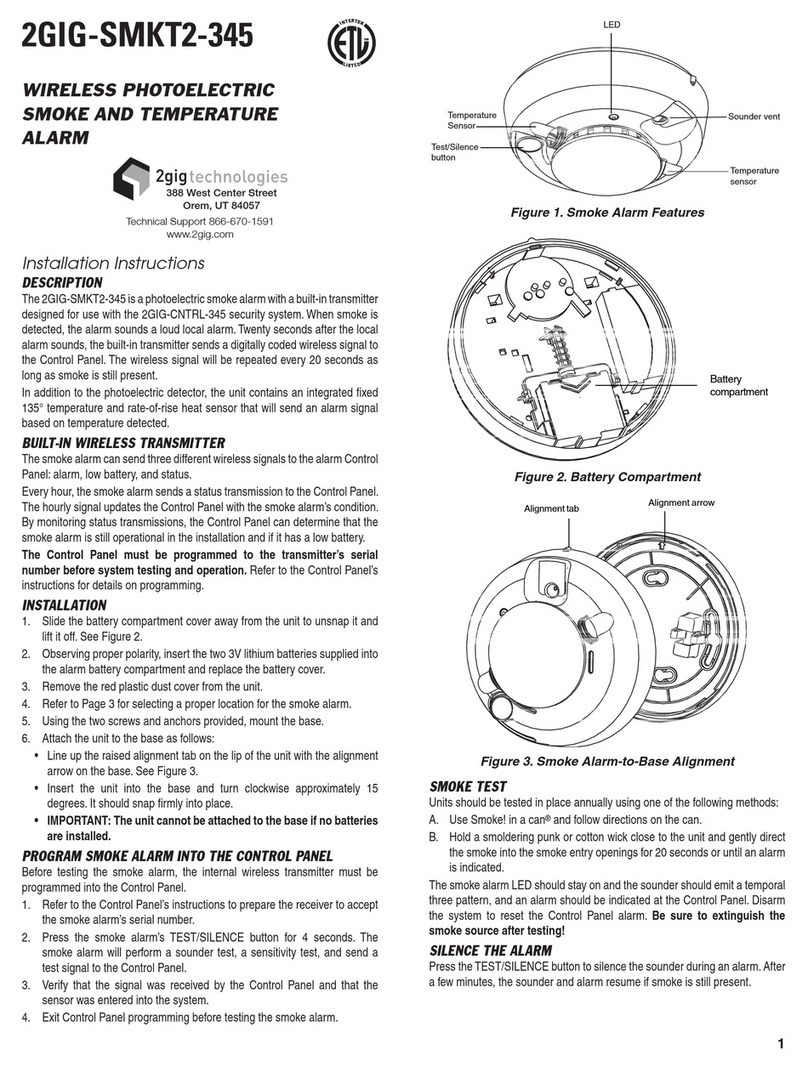
2gig Technologies
2gig Technologies 2GIG-SMKT2-345 installation instructions
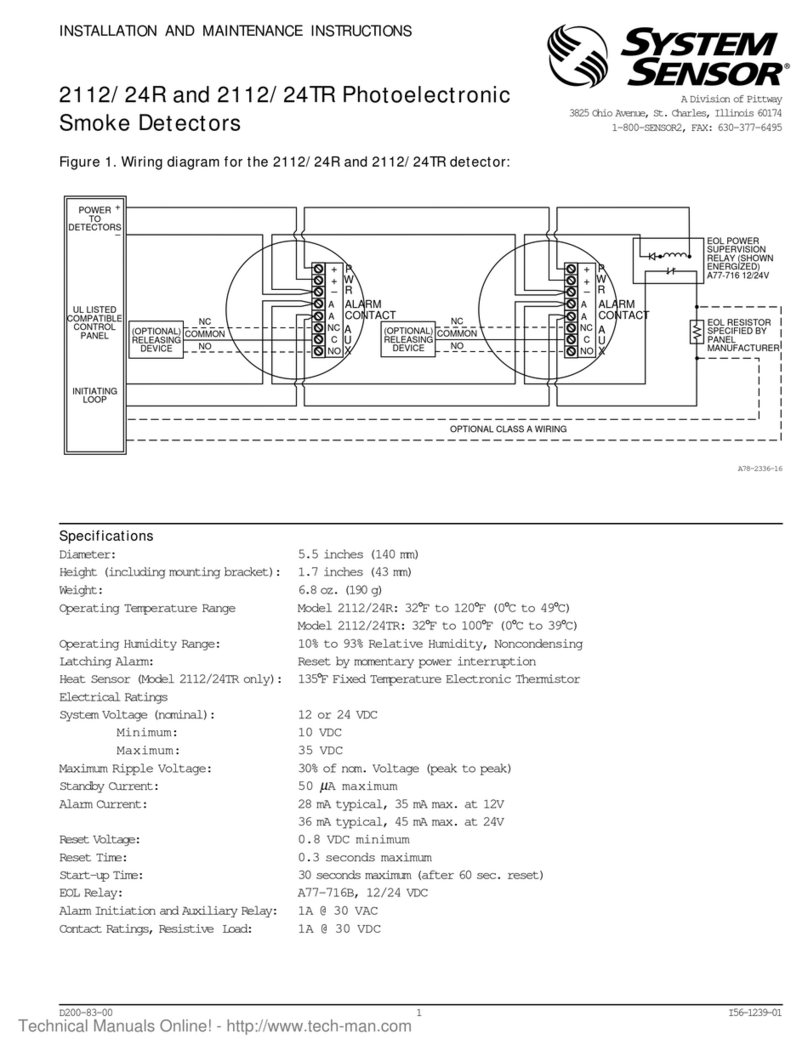
System Sensor
System Sensor 2112/24R Installation and maintenance instructions
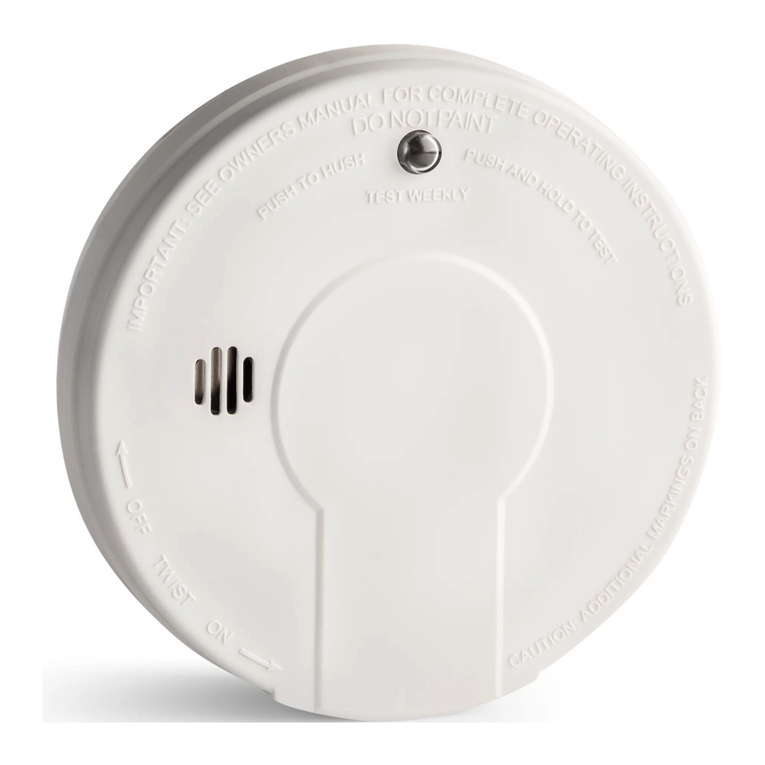
Kidde
Kidde P9050 user manual

Nemaxx
Nemaxx HW-2 Original operating instructions

Telenot
Telenot HD 1000 Operating and assembly instructions
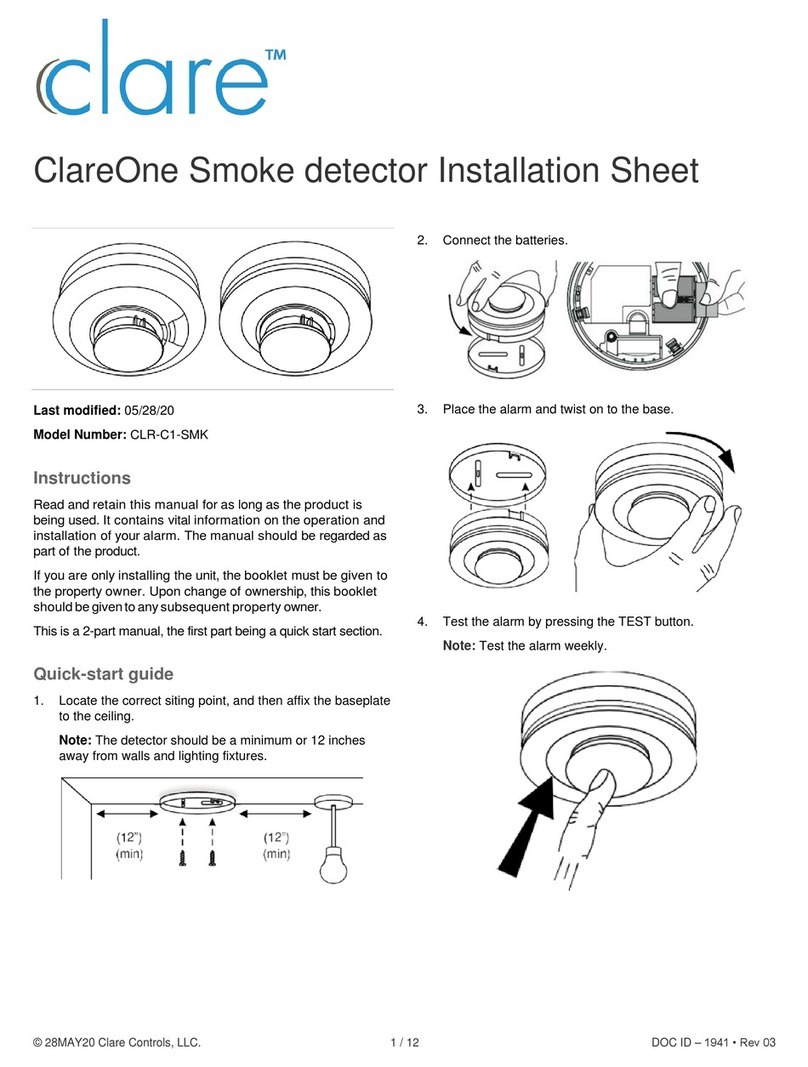
clare
clare ClareOne CLR-C1-SMK Installation sheet
